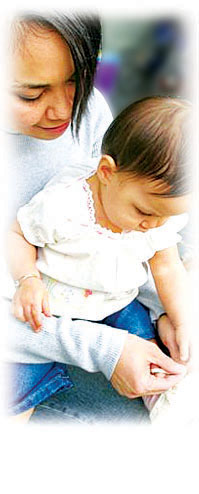Vaccination
There are many ways to lower cancer risk, including vaccinations. Cancer vaccines increase the ability of an individual’s immune system to protect the body from damaged or abnormal cells, including cancer cells. Certain forms of cervical cancer and liver cancer are both vaccine-preventable. However, the uptake of these vaccinations as complete series is essential to achieve the vaccines’ potential to prevent cancer.
HPV Vaccination
Human papillomavirus (HPV) causes almost all cervical cancers, as well as anal, vaginal, vulvar, penile and throat cancers. HPV vaccination has the potential to prevent approximately 90% of cervical cancers, and the majority of vulvar, vaginal and anal cancers.
HPV vaccines are for females aged 9-26 and males aged 9-15 and are most effective if given before exposure to the HPV. The vaccine is given in a series of three separate shots over several months. In order to be fully protected by the vaccine, patients must receive all three shots.
Native women have had higher rates of cervical cancer incidence and mortality (nearly 2x greater) than the rates of white women in Indian Health Services Contract Health Service Delivery Areas.1 Studies on HPV vaccination in Native communities have found that low rates of HPV vaccination call for locally and culturally relevant information and education efforts.2
The Centers for Disease Control and Prevention (CDC) and the President’s Cancer Panel have identified improving uptake of HPV vaccines as a public health priority to reduce cancer in the US population. Coordinated effort by public and private organizations, such as the National HPV Vaccination Roundtable, are working to increase HPV vaccine uptake.
Watch our webinar on Cancer risk reduction in Indian Country Cervical Cancer and HPV Webinar for more information.
Liver Cancer and Hepatitis B Vaccination
Chronic Hepatitis B Virus (HBV) and/or Hepatitis C Virus (HCV) infection can lead to hepatocellular carcinoma, a type of liver cancer. American Indians and Alaska Natives face up to three times greater death rates from chronic liver disease, associated with HBV and HCV. HBV vaccination can prevent infection and potential cancer development. The HBV vaccine has been in use since the 1980’s and today, most children are vaccinated against HBV shortly after birth, according to immunization guidelines.3
A HCV vaccination has yet to be developed, however HCV treatment is available and has reported cure rates of 76-99%. Screening, early detection, and treatment HCV are vital in protecting AI/AN populations. For more information, watch our webinar discussing cancer risk reduction.

Sources
- Meg Watson, Vicki Benard, Cheryll Thomas, Annie Brayboy, Roberta Paisano, and Thomas Becker. Cervical Cancer Incidence and Mortality Among American Indian and Alaska Native Women, 1999–2009. American Journal of Public Health: June 2014, Vol. 104, No. S3 pp. S415-S422. doi: 10.2105/AJPH.2013.301681
- 4Buchwald, D, Muller, C, Bell, M, Schmidt-Grimminger, D. Attitudes toward HPV Vaccination among Rural American Indian Women and Urban White Women in the Northern Plains. Health Educ Behavior 2013 Dec;40(6):704-11. doi: 10.1177/1090198113477111. Epub 2013 Mar 4.;Schmidt-Grimminger D, Frerichs L, Black Bird AE, Workman K, Dobberpuhl M, Watanabe-Galloway S, HPV knowledge, attitudes and beliefs among Northern Plains American Indian adolescents, parents, young adults, and health professionals. Journal of Cancer Education 2013;28(2):357–66. doi:10.1007/s13187-013; Bowen et. al. Journal of Racial and Ethnic Health Disparities 2014 Jan; 1 (1) 45-51. doi: 10.1007/s40615-014
- U.S. Centers for Disease Control and Prevention. A comprehensive immunization strategy to eliminate transmission of hepatitis B virus infection in the United States: recommendations of the Advisory Committee on Immunization Practices (ACIP) Part 1: immunization of infants, children, and adolescents. Morbidity and Mortality Weekly Report 2005; 54(No. RR–16):1–31.
LINK: American Indian Cancer Foundation
LINK: American Journal of PReventive Medicine
Link CDC:
HPV Vaccine Recommendations
This resource from the Centers for Disease Control and Prevention offers information on vaccine recommendations, dosing schedules, contraindictions and precautions, pregnancy, vaccine safety, and adverse reactions.
Link IHS Immunization Program HPV Toolkit
HPV Toolkits developed by other organizations, resources for providers, parents and patients, best practices and toolkits for IHS and Tribal clinics, Community Health Worker/Representative Resources, Continuing Education, IHS Specific Continuation Education Opportunities through Project ECHO.
Link CDC Vaccinations and Immunizations: American Indians and Alaska Natives
Centers for Disease Control and Prevention resources for AI/AN populations on vaccines, immunizations, recommended schedules, and community outreach materials.
Link CDC Vaccinations and Immunizations: preteens and teens
Centers for Disease Control and Prevention resources for preteens and teens on vaccines, immunizations, recommended schedules, and community outreach materials.
Link IHS Vaccine Preventable Diseases
The Indian Health Services and Centers for Disease Control and Prevention have partnered on the National Immunization Program to work with Tribes and tribal health programs across the country.
PDF National HPV Vaccination Roundtable
National HPV Vaccination Roundtable is a coalition of public, private, and voluntary organizations with expertise relevant to increasing HPV vaccination coverage in the United States as a way to reduce illness and death from HPV-associated cancers through leadership, strategic planning, and advocacy. NNN Partner, the Northwest Portland Area Indian Health Board sits on the Roundtable.
Link Call to Action: HPV Vaccination as a Public Health Priority
Call to Action by leading public health organizations urging healthcare professionals to be stronger advocates for HPV vaccination to prevent related cancers
- See more at: http://www.adolescentvaccination.org/hpv-resource-center#sthash.BIb6K1X7.dpuf
Link Recommendations for Testing, Treating, and Managing Hepatitis C
American Association for the Study of Liver Diseases and Infectious Diseases Society of America recommendations and information on Hepatitis C.